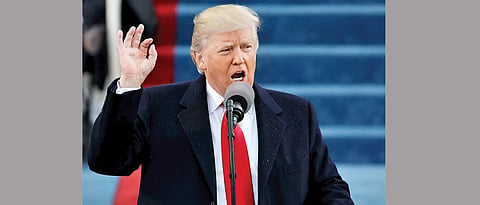

The literary meaning of ‘trump card’ is ‘a valuable resource that may be used, especially as a surprise, to gain an advantage.’ In any manner, even by phonetic, it does not sound a dump card. But considering two recent decisions by Donald Trump (not Donald Dump!), it seems that, according to the diplomatic dictionary of White House edited by Donald Trump, there is a synonymous between the ‘Trump’ and the ‘Dump’. The Trump’s decision to pull out the US from the Joint Comprehensive Plan of Action (also known as ‘Iran Deal’) and seeking to impose highest levels of sanctions on Iran exemplifies the unreliable nature of the Trump administration. This U-turn on the Iran deal has shown that it is not in India’s favour to rely any more on Washington when it comes to a critical juncture of India’s national interest. Sushma Swaraj’s outspoken words, “We don’t make our foreign policy under pressure from other countries,” speak for itself.
India has started dumping so-called ‘Trump Card’ by its two important foreign policy decisions. These decisions come amidst criticism on India for India’s excessive leaning towards Washington. These decisions include continuing trade relations with Iran despite US sanctions against Iran and its missile deal with Russia. These policies enunciated by India is a strong signal to the Trump administration for his flip-flop on the diplomatic floor. From the beginning, the United States has been insisting stable and responsible behaviour from India. Barack Obama even preached Indian parliamentarians that ‘power comes with responsibility.’ Now it is India’s turn to give some lessons of responsibility to America. India is doing the same thing. India’s decision to continue trade with Iran is an important diplomatic move for several reasons. First, the current increasing price of petrol in India is the biggest challenge before Modi government in the wake of the next general election. One of the reasons for increasing oil prices is the US sanction against Iran, which has a huge domestic impact on India.
Iran is the second largest supplier of crude oil to India, supplying more than 4,25 lakh barrels of oil per day, and India is one of the biggest foreign investors in Iran’s oil and gas industry. This domestic necessity circumscribed India to take against the US policy on Iran. Second, India along with Iran and Afghanistan are jointly developing the strategic Chabahar port on the southeastern coast of Iran that will give access to Afghanistan by-passing Pakistan. Considering China’s influencing maritime relations with Pakistan and its attempt at improving strategically important Gwadar port, the Chabahar port has a huge geostrategic and geo-economical importance for India. India does not want to hamper this strategic cooperation with Iran and Afghanistan keeping an eye on Pakistan and China’s maritime cooperation.
India is planning to procure ‘S-400 Triumf air defence missile system’ for the Indian Air Force from Russia. ‘S-400’ is known as Russia’s most advanced long-range surface-to-air missile defence system. China was the first foreign buyer to seal a government-to-government deal with Russia in 2014 to procure the lethal missile system. Two mutual but contradictory perceptions are dominant in the relation between India and Russia. First led by Russia who thinks India’s growing relations with Israel and America would hamper its relations with India especially in Defence procurement. On the other side, Russia’s increasing engagement with Pakistan and China is seen with suspicion in India. Historically, defence procurement has been the key medium for India-Russia relationship. With this planning of procuring ‘S-400’ missile, India has given priority to ‘old ally’ instead of an ‘uncertain ally’.
Considering India’s reliance on oil and secondly, its dependency on weapons, both Iran and Russia are respectively key partners for India’s great power ambitions. India and America are considered as natural partners. Both have agreed on several issues including terrorism, concern over the emergence of China and stable and just order in Asia. However, the recent unreliable policy of Trump has hampered India domestically and internationally. Strategic autonomy influenced by domestic necessity is the emerging mantra in India’s external engagement. Hope Trump administration will understand that their natural partner is dumping its ‘Trump Card.’
